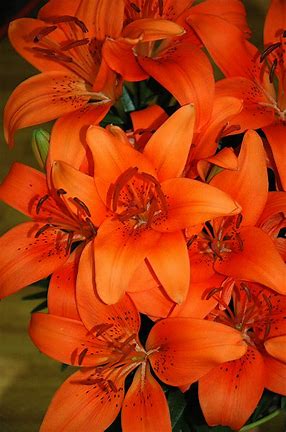Riverdene Garden Centre
Tiny Invader Lily
Tiny Invader Lily
Couldn't load pickup availability
The Tiny Lily Series is a compact, dwarf Asiatic lily collection, known for its bright, upward-facing blooms, sturdy stems, and early summer flowering. These hardy, low-maintenance perennials reach only 12-16 inches tall, making them perfect for borders, containers, rock gardens, and small spaces. With a wide range of colors, Tiny Lilies provide long-lasting color and excellent cut flowers while being drought-resistant and easy to grow.
Planting & Growing Conditions
- Hardiness Zone: 3-9 (cold-hardy and suitable for prairie gardens)
- Mature Size: 12-16 inches tall, 10-14 inches wide
- Growth Rate: Fast
-
Sunlight Needs:
- Full sun to partial shade (at least 6 hours of direct sunlight daily for best flowering)
-
Soil Requirements:
- Prefers well-drained, fertile soil
- Slightly acidic to neutral pH (6.0-7.0)
- Avoid heavy clay or overly wet soil, which can cause bulb rot
- Spacing: 10-12 inches apart for compact growth
Watering & Maintenance
-
Young Plants (First Year):
- Water deeply 1-2 times per week until roots establish
-
Established Plants:
- Water moderately, keeping soil moist but not soggy
- Reduce watering after blooming to allow bulbs to harden
-
Mulching:
- Apply a 1-2 inch layer of mulch to retain moisture and protect roots
Fertilizing
- First Year: No fertilizer needed—use organic compost at planting
-
Mature Plants:
- Apply a balanced, slow-release fertilizer (e.g., 10-10-10) in early spring
- A second feeding after flowering strengthens bulbs for the next season
- Avoid excess nitrogen, which promotes foliage growth over blooms
Pruning & Maintenance
- Best Time to Prune: After blooming (late summer to fall)
-
How to Prune:
- Deadhead spent flowers to prevent seed formation (redirects energy to the bulb)
- Allow foliage to naturally die back, as it feeds the bulb for next year’s blooms
- Cut back dead stalks in fall for a tidy garden
Flowers, Foliage & Seasonal Interest
- Bloom Time: Early to mid-summer (June-July)
-
Flower Colors:
- Wide variety of colors, including red, orange, yellow, pink, and bi-color blooms
- Upward-facing flowers, making them excellent for container displays
- Fragrance: Mild to none (unlike Oriental lilies, Asiatic lilies are not heavily scented)
-
Foliage:
- Dark green, lance-shaped leaves
- Compact, clump-forming habit—ideal for small gardens
Pest & Disease Management
Resistant to: Deer, rabbits, and most common pests
Common Pests:
-
Lily Beetles – Red beetles that chew leaves
- Solution: Handpick or apply neem oil
-
Aphids – Can cause curling leaves
- Solution: Spray with insecticidal soap
Common Diseases:
-
Botrytis Blight (Fungal Leaf Spot) – Brown spots on leaves
- Solution: Improve airflow, avoid overhead watering, apply fungicide if needed
-
Bulb Rot – Caused by wet, poorly drained soil
- Solution: Ensure well-drained soil and avoid overwatering
Winter Protection
- Cold-hardy to Zone 3—no special protection needed in most climates
-
Mulching:
- Apply a 2-3 inch layer of mulch in late fall to protect bulbs from extreme temperature changes
-
Container-Grown Lilies:
- Move pots to a sheltered area or unheated garage in winter to prevent bulbs from freezing solid
Landscape Uses
Perfect for borders, edging, and rock gardens
Excellent for container gardens and patios
Low-maintenance and drought-tolerant once established
Great as cut flowers—long vase life
Ideal for mass plantings and small-space gardening
Popular Varieties in the Tiny Lily Series:
- ‘Tiny Bee’ – Bright yellow flowers with dark centers
- ‘Tiny Rocket’ – Deep red blooms with a velvety finish
- ‘Tiny Ghost’ – Dark burgundy-purple flowers
- ‘Tiny Orange Sensation’ – Vivid orange with spotted centers
- ‘Tiny Pearl’ – Soft pink flowers with white accents
Companion Planting Ideas for Tiny Lilies:
- Daylilies (Hemerocallis) – Similar size and bloom time, easy to grow together
- Coreopsis – Contrasting yellow blooms add brightness
- Sedum & Creeping Phlox – Provides low-growing foliage to cover soil around lilies
- Dwarf Ornamental Grasses – Adds texture and movement
- Hostas & Ferns – Offers shade for the bulbs while adding lush greenery
Additional Notes:
- Lifespan: 5+ years with proper care
- Easiest propagation method: Division of bulbs every 3-4 years
- Highly recommended for beginner gardeners due to its resilience and adaptability
Photo courtesy of Vandermeer Nursery
Share


